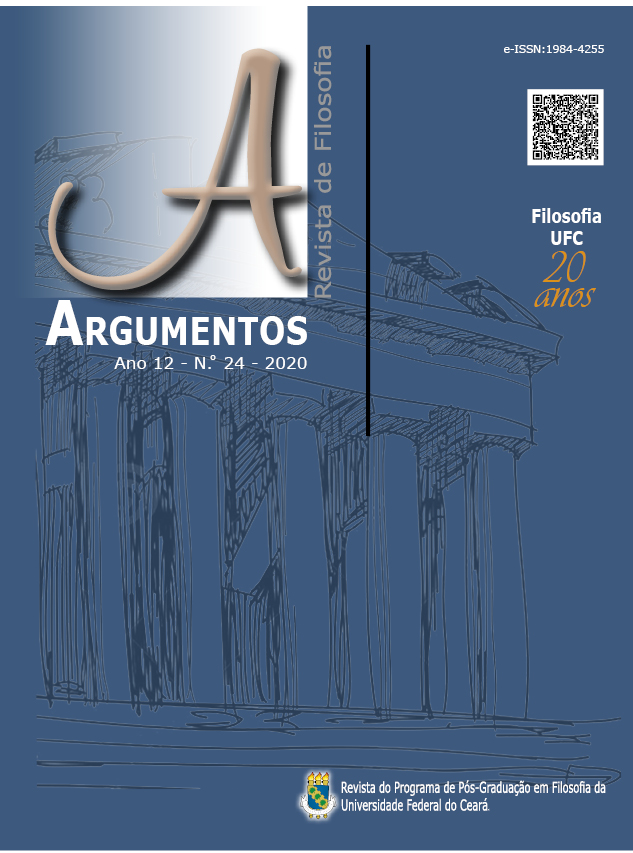Teaching Philosophy and responsibility for the world: (in) appropriate approaches between Paulo Freire and Hannah Arendt
DOI:
https://doi.org/10.36517/Argumentos.24.8Keywords:
Teaching of philosophy. Education. World. Responsibility.Abstract
The present text intends to discuss an approach between Hannah Arendt and Paulo Freire. This approach doesn’t deny the specificities of each author and the limits that demarcate their interests as thinkers. Then, we centralize the approach in that what we seem to be an intersection between both, that it is: a notion of education as responsibility for the world and, in this context, we’re going to talk over the relevancy of the teaching act of teaching philosophy in specific. We take as methodology the textual exegesis.References
ALMEIDA, Vanessa S. Amor mundi e Educação: reflexões sobre o pensamento de Hannah Arendt. 2009.193p. Tese (Doutorado em filosofia) - Universidade de São Paulo. 2009.
ALBUQUERQUE. Targélia de S. Gestão Paulo Freire: A ousadia de democratizar a “educação na cidade de São Paulo (1989- 1991). In: Paulo Freire: Vida e Obra. Org. Ana Inês. São Paulo. Expressão Popular. 2010.
ALVES NETO. Rodrigo Ribeiro, Alienação do Mundo: uma interpretação da obra de Hannah Arendt. São Paulo: Ed. Loyola /PUC-Rio. 2009.
AGUIAR. Odílio Alves. Direitos humanos como “direito a ter direitos” em Hannah Arendt. In: Filosofia e Direitos humanos. Org. Odílio Alves Aguiar et al. Fortaleza. Ed. UFC. 2006.
ARENDT. Hannah. A vida do Espírito. Trad. Cesár Augusto de Almeida et.al. Rio de Janeiro – RJ. Ed. Cia das Letras. 2009.
ARENDT. Hannah. Entre o passado e o futuro. Trad. Mario W. Barbosa. São Paulo – SP. Ed. Perspectiva. 2001.
ARENDT. Hannah. A condição Humana. Trad. Roberto Raposo. Revisão Técnica: Adriano Correia. 13ª edição. Rio de Janeiro. Forense Universitário. Rio de Janeiro. 2019.
DUARTE. André. Hannah Arendt e pensamento político: a arte de distinguir e relacionar conceitos. Revista Reflexões. Ano, 5, nº. 9. De Jan/jun de 2013. Acesso em 20/05/2020. http://www.periodicos.ufc.br/argumentos/article/view/19001/29720
FREIRE. Paulo. Pedagogia da Autonomia: saberes necessários à prática educativa. Rio de Janeiro – RJ. Ed. Paz e Terra. 1999.
FREIRE. Paulo. Pedagogia do Oprimido. Paulo Freire. Rio de Janeiro – RJ. Ed. Paz e Terra. 2005.
FREIRE. Paulo. Carta do direito e do dever de mudar o mundo. In: Paulo freire – Vida e obra. Org. Ana Inês Souza. São Paulo. Ed. Expressão Popular. 2010.
FREIRE. Paulo. Pedagogia da Esperança: um reencontro com a pedagogia do oprimido. Rio de Janerio – RJ. Ed. Paz e Terra. 1992.
FIORI. Ernani Maria. Aprender a dizer a sua palavra [Prefácio] In: Pedagogia do Oprimido. Paulo Freire. Rio de Janeiro – RJ. Ed. Paz e Terra. 2005.
HEGEL. Fenomenologia do Espírito. Trad. Paulo Meneses. 3ª ed.. Petrópolis – RJ. Editora Vozes.1997.
LIMA VAZ. Henrique Cláudio. A formação do pensamento de Hegel. São Paulo – SP. Ed. Loyola. 2014.
PLATÃO. Apologia de Sócrates. Coleção os pensadores. São Paulo – SP. Editora nova Cultural. 1999.
PLATÃO. A República. Trad. Maria Helena. Lisboa. 3ª Edição. Ed. Calouste. 1980.
WU. Roberto. Do desejo ao reconhecimento: a luta pela afirmação da autoconsciência. In: Comemoração aos 200 anos da “Fenomenologia do Espírito “ de Hegel.. Org. Eduardo Chagas Et. al. Fortaleza. Ed. UFC 2007.
RODRIGO. Lídia Maria. Filosofia em sala de aula: teoria e prática para o ensino Médio. Col: Formação de Professores. Campinas – SP. Ed. Autores Associados. 2009.
SILVA. Ricardo George de A. Educação e Responsabilidade pelo mundo: reflexões em torno do pensamento arendtiano. In: O futuro entre o passado e o presente – anais do V encontro Hannah Arendt. Org. Odílio Alves Aguiar et. Al. Ed. Passo Fundo. IFIBE. 2012.
KOJÈVE, A. Introdução à leitura de Hegel. Rio de Janeiro. Ed. Contraponto, 2002.
Downloads
Published
Issue
Section
License
Argumentos magazine is licensed under an International Creative Commons Attribution License.
The Magazine uses CC BY inclusion
1) The authors retain the copyright granted to the magazine or the right to initial publication, with the work regularly licensed under the Creative Commons Attribution, which allows the sharing of the work with acknowledgment of authorship and initial publication in this magazine.
2) The authors are authorized to contract additional applicable contracts, for non-exclusive distribution of the version of the work published in this journal (for example, publication in the institutional repository or as a chapter of the book), recognition of authorship and initial publication in this journal.
3) Authors are authorized and encourage to publish and distribute their work online (for example, in institutional repositories or on their personal pages) at any time before or during the editorial process, as they can generate productive changes, as well as increase the impact and reference of published work.




.jpg)










._._3.png)
1.jpg)
._._._.png)
